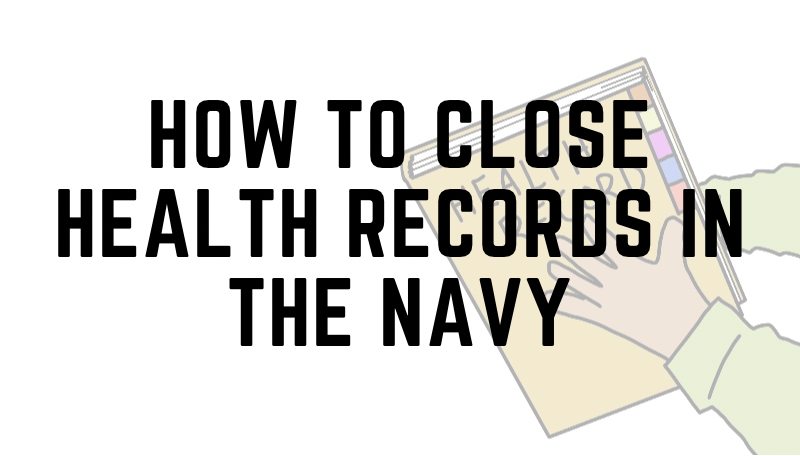For what reasons can you close an active duty’s health records?
- The member is dead or declared dead.
- The member is discharged from the facility.
- The member resigned.
- The member is released from active duty.
- The member retires.
- The member transfers to the Fleet Reserve or inactive duty.
- The member is missing in action or MIA.
- The member commits desertion.
- The member is disenrolled as an officer candidate or midshipman.
Things to do when closing a health record (HREC)
- The record is in order.
- There are no loose papers.
- All the identification data is consistent.
- All tests like a lab, x-ray, etc, and reports are printed and sorted.
- Record the closing entry on the NAVMED 6150/4, Abstract of Service, and Medical History.
- Include the date of separation.
- Include the title of servicing activity.
- Include any explanation of the circumstances.
What to do with health records upon final discharge or death
- Send the complete and verified health and dental records to the command maintaining the member’s service records (no later than the day following the separation) for inclusion in the transmittal with the member’s service record.
- Make sure the original separation physical exam documents are included in the HREC before delivering to the command maintaining the member’s service record.
- In the case of death, send a copy of the death certificate along with the transmitted records.
If a member requests a copy of their HREC, it’s free of charge upon their release, discharge, or retirement.
What happens to health records for missing in action members?
When a member disappears and you can’t determine if there are any signs of death, the medical staff will enter a summary of the circumstances on the SF600 Form.
The form must include the circumstances about the disappearance, status (missing or missing in action), and supporting documents that may help.
The records will then be closed similarly to the case of a discharged service member.
What happens to health records during desertion?
When an active duty is a deserter, the medical staff must document the event on the SF 600 Form, the EZ603A, and the NAVMED 6150/4. The HREC and DREC will be delivered to the member’s CO for inclusion in and transmittal with the service record for both Navy and Marine Corps personnel.
If and when the deserter is found and apprehended, the CO that has jurisdiction is required to submit a request for the member’s records of Bureau of Navy Personnel (BUPERS) or Commandant of the Marine Corps (CMC).
What happens to health records at retirement?
When an active duty is about to retire or moves to Fleet Reserve List, the HREC is closed.
The retiring member can ask to establish a new medical record known as OREC.
A copy of the retiring member’s active duty HREC can be added to the new NAVMED 6150/21-30 folder.
The medical staff member must make an entry on the SF 600 in the HREC as well as in the OREC. In these records, make sure to state the date that the HREC had closed.
Dental Records should be verified and retired at the same time, and then forwarded to the National Personnel Records Center, Military Personnel Records, St. Louis, Missouri.
What happens to health records during disability separation or retirement?
The medical treatment facility will send a copy of the HREC to the VA (Department of Veteran Affairs) if the member is being separated for a disability. The VA can be the one nearest to where the member lives.
Make sure to send that record directly to the VA so that it’s considered a primary source which will help with processing the claim for veteran’s benefits.
If the member were to bring in and hand off his or her records to the VA, then this would be considered a secondary source and cannot be used to process claims.
You have to send the record with the VA 526, Claim of Benefits, so the VA office can initiate the claim.
However, if the member is separating from the service and eligible for VA benefits, that member will be given a copy of his or her HREC upon request.
Keep in mind that it’s very important that a copy of a patient’s records should be sent to the regional VA office.


